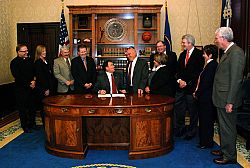Director of State Historical Society retires after 40 years

SALT LAKE CITY — Philip Notarianni, Ph.D., has decided to retire on March 31, after a 40-year career as a historian and director of the Division of State History. He is a member of Our Lady of Lourdes Parish in Magna. "My career has been very rewarding," said Notarianni. "I look at retirement, not as the end, but as the beginning of something else." Upon hearing of Notarianni’s retirement, Utah Gov. Gary Herbert sent a letter thanking him for his contributions, especially in his first assignment with the division, where he conducted a historic sites survey and documented Eureka and the Tintic Mining District. "That led Notarianni to work with the local residents to establish the Tintic Historical Society, the results of which include one of the first Multiple Resource Nominations in the United States to the National Register of Historic Places, and the publication of his book "Faith, Hope and Prosperity: A History of the Tintic Mining District," wrote Herbert. "It led to the recognition of the Tintic Historical Society as the best local historical society in the nation." The Tintic assignment led Notarianni to know, early in his career, that he wanted to get into public history and that it would serve him best to be involved in all the related topics of history. "I’ve done oral histories, helped edit histories as director and been involved in the history of preservation," he said. "I’ve studied historic sites, and when I was in the museum program from 1982 to 2003, I was involved in the material culture of artifacts and how to display them. "My philosophy is that history is everything that comes together to help develop or guide whatever is being done," Notarianni said. "Architecture, geography, archeology, historic sites, folk traditions and folklore are all history. So I’ve been involved in all these areas and the strong point of that is it gets you to the people – and it’s all the people, not just the powerful and wealthy people – that produce history." While in graduate school at the University of Utah, he befriended Helen Papanikolas, the dean of ethnic historians. "She was the first to look at non-Mormon groups in Utah and to do so you have to look at the mining and railroading history of Utah because that is why immigrants came to Utah," he said. "That is where I got started and, being Italian, I did a master’s thesis on the Italian immigrants in Utah." Since 1982, Notarianni has taught a Peoples of Utah class for the Ethnic Studies department at the University of Utah, "providing hundreds of students with an understanding and appreciation of Utah’s rich ethnic diversity," wrote Herbert, adding that Notarianni is "the ideal public historian – one who researches, writes, teaches, preserves, connects with local communities, and advances local and state history through scholarships, enthusiasm for people and his immense administrative abilities as manifested during the past eight years as director of the Division of State History." "Phil should have credit for starting a whole new wave of understanding Utah history," said Gary Topping, archivist for the Diocese of Salt Lake City. "I’m sorry he’s leaving the Historical Society because he’s been a really great director largely because of his personality." Notarianni and Topping met at the University of Utah and worked together at the Utah State Historical Society for 13 years. "He is just a splendid person with a wonderful sense of humor," Topping said. "He is very smart, hard working, easy to get along with and a devoted Catholic." Notarianni grew up in Magna and has been a life-long parishioner of Our Lady of Lourdes. "He’s a very genuine, humble man and he is the first Catholic to hold such a position in the state," said former pastor Father Andrzej Skzypiec, now pastor of St. Ambrose.
© Copyright 2024 The Diocese of Salt Lake City. All rights reserved.

Stay Connected With Us